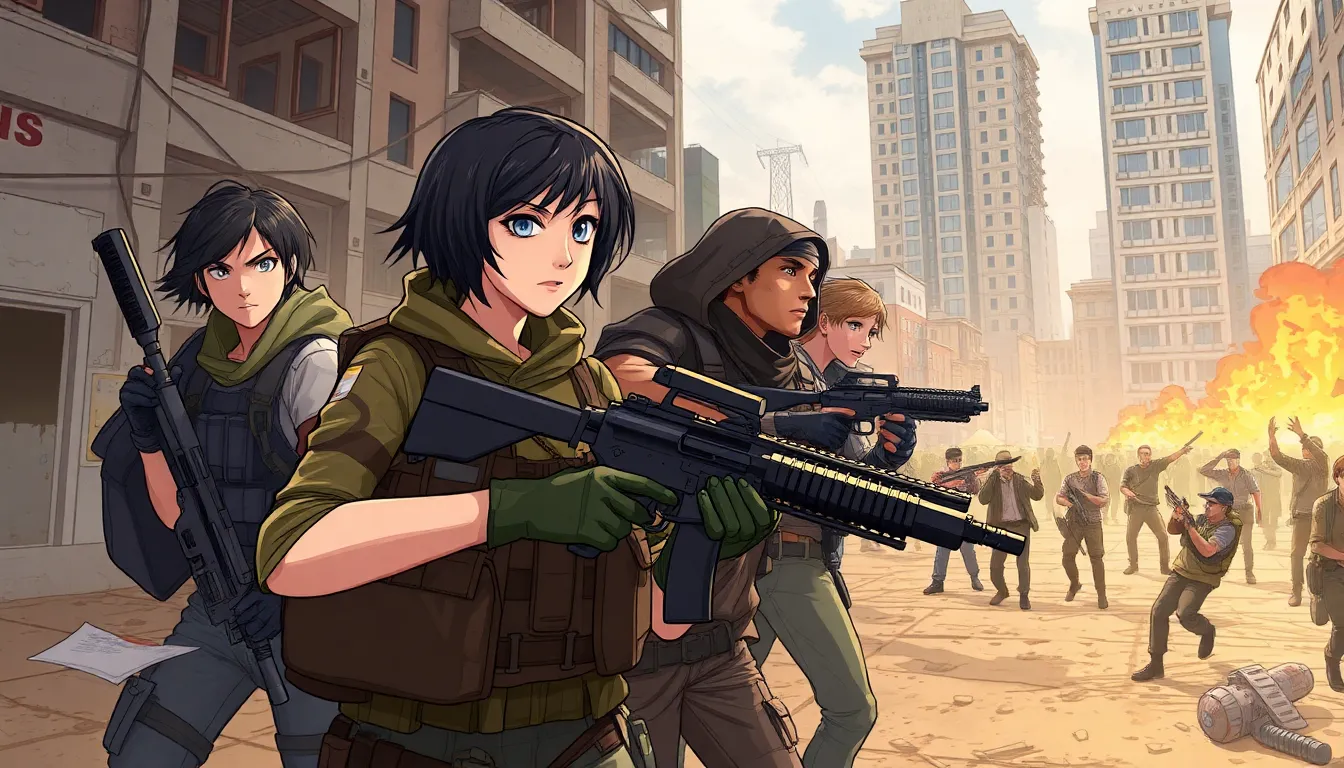In a world where the undead roam freely and snacks are a scarce commodity, multiplayer zombie games offer the perfect blend of adrenaline, strategy, and a chance to unleash your inner survivalist. Whether you’re teaming up with friends or battling strangers, these games turn every corner into a potential ambush and every decision into a life-or-death scenario. Who knew that dodging brain-hungry zombies could be so much fun?
Multiplayer Zombie Games
Multiplayer zombie games immerse players in intense survival scenarios filled with challenges and teamwork. These games invite players to confront the undead, manage limited resources, and strategize for survival.Definition and Genre Characteristics
Multiplayer zombie games fall within the survival horror genre. Players team up to face waves of zombies while scavenging for weapons, ammunition, and supplies. Cooperation plays a crucial role, as communication enhances strategy and resource management. Each game typically features unique objectives, ranging from base building to mission completion. Varied environments, such as desolate cities and dense forests, create distinct atmospheres and obstacles. Players encounter different types of zombies, each with unique traits, requiring adaptable tactics and quick thinking.Evolution of the Genre
The genre began with titles like “Resident Evil” and “Left 4 Dead,” setting the foundation for cooperative gameplay against undead enemies. Over time, multiplayer elements gained popularity, leading to more complex experiences. “DayZ” and “H1Z1” introduced open-world mechanics, allowing players to explore expansive maps while surviving against both zombies and other players. Technological advancements in graphics and online connectivity further enhanced realism and engagement. Streamed content and e-sports events have contributed to the genre’s growth, attracting diverse audiences and inspiring new franchises.Popular Multiplayer Zombie Games

Game 1: Call of Duty: Zombies Mode
Call of Duty’s Zombies mode combines fast-paced action with survival horror. Players face waves of undead while completing complex objectives. Unique perks enhance gameplay, and each map offers diverse environments and challenges. The introduction of Easter eggs adds layers to exploration, enticing players to delve deeper into the game’s lore. Team communication plays a key role, as coordination often determines survival and success against the relentless hordes.Game 2: Left 4 Dead 2
Left 4 Dead 2 delivers exhilarating cooperative gameplay focused on teamwork and strategy. Players select from diverse characters, each with unique abilities. The highly adaptive AI Director dynamically alters situations, ensuring a fresh experience in every session. Missions range from urban environments to rural settings, providing various scenarios and challenges. Quick decision-making and resource management become critical, letting players thrive amidst chaos.Game 3: Dead by Daylight
Dead by Daylight innovates the multiplayer zombie genre by adding an asymmetrical gameplay element. One player takes on the role of a killer, while others play survivors attempting to escape. Unique characters and abilities keep gameplay fresh, with each survivor needing different tactics to prevail. Environmental elements create strategic advantages, and the need for cooperation among survivors intensifies the thrill. Players enjoy a balance of tension and excitement, making for memorable experiences.Gameplay Mechanics
Multiplayer zombie games offer a blend of unique mechanics that enhance player engagement and challenge. Players navigate survival scenarios with diverse approaches, depending on the game type.Cooperative vs. Competitive Play
Cooperative play fosters teamwork among players, requiring communication to succeed against waves of zombies. In these scenarios, players strategize to maximize resource management and coordinate attacks. Competitive play, on the other hand, pits players against each other while fending off zombies, creating tension. Titles like “Dead by Daylight” exemplify this aspect, inviting one player to take on the killer role while others seek survival. Each format encourages distinct gameplay experiences that increase the excitement and replayability of the genre.Survival Elements
Survival elements play a vital role in multiplayer zombie games, demanding resourcefulness from players. Players scavenge for weapons, ammunition, and health supplies, adding depth to their experience. Environments often include limited resources, pushing players to collaborate effectively. Game mechanics may introduce crafting systems, allowing players to create gear or traps. Dynamic weather conditions often affect gameplay, requiring adaptability. Overall, these survival aspects create an immersive atmosphere, amplifying the urgency and thrill of the zombie apocalypse experience.Community and Multiplayer Experience
Multiplayer zombie games create rich environments for players to connect through shared challenges and experiences. These interactions enhance gameplay and foster a sense of community.Player Interaction
Player interaction plays a vital role in multiplayer zombie games. Collaboration leads to effective strategies, especially when facing overwhelming waves of zombies. Unique communication methods, such as voice chat or in-game signals, empower players to coordinate actions seamlessly. Diverse characters allow for varied play styles, encouraging team dynamics that influence success. Joining forces to complete objectives fosters camaraderie. Friendly rivalries also emerge, enhancing the competitive spirit while navigating cooperative tasks. Each interaction shapes the overall gaming experience, creating lasting memories among players.Online Communities
Online communities thrive around multiplayer zombie games. Forums and social media platforms facilitate discussions about strategies and experiences. Players share tips, create fan art, and post videos of memorable moments, strengthening connections within the community. Many games have dedicated Discord channels, allowing real-time interaction and organization of events. Collaborations often lead to organized tournaments, adding excitement to the competitive aspect. Players benefit from these communities, finding support and friendships while enhancing their gameplay skills. The sense of belonging significantly enriches the overall experience of navigating the zombie apocalypse together.Future Trends in Multiplayer Zombie Games
Technological advancements are reshaping multiplayer zombie games, enhancing player experiences and gameplay mechanics. Developers increasingly utilize virtual reality, bringing immersive environments that heighten the survival experience. Artificial intelligence also plays a crucial role, creating smarter zombie behaviors that adapt to player strategies. Enhanced graphics capabilities contribute to more realistic visuals, engaging players on a deeper level. Smoother online connectivity improves multiplayer interactions, allowing for seamless gameplay with minimal latency issues. Potential game developments are set to expand the genre’s appeal further. Cross-platform play is becoming a standard feature, enabling players on different consoles to team up. Frequent updates and seasonal content add new challenges and environments, maintaining player interest. Expanding narratives with episodic storytelling introduces compelling storylines, inviting players to invest emotionally in their survival journey. Furthermore, integrating user-generated content allows for creative customization, tailoring each experience to individual preferences. With these developments, the future of multiplayer zombie games holds exciting possibilities.
Potential game developments are set to expand the genre’s appeal further. Cross-platform play is becoming a standard feature, enabling players on different consoles to team up. Frequent updates and seasonal content add new challenges and environments, maintaining player interest. Expanding narratives with episodic storytelling introduces compelling storylines, inviting players to invest emotionally in their survival journey. Furthermore, integrating user-generated content allows for creative customization, tailoring each experience to individual preferences. With these developments, the future of multiplayer zombie games holds exciting possibilities.



